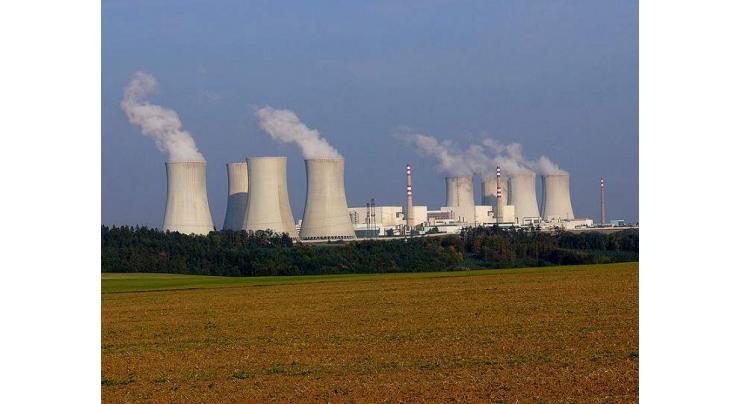
- Home
- World
- News
- World Nuclear Association Says More Reactors Needed for Low-Carbon Future After COVID-19
World Nuclear Association Says More Reactors Needed For Low-Carbon Future After COVID-19
Muhammad Irfan Published May 09, 2020 | 12:39 AM

Countries across the globe need to begin construction on more new reactors to meet the world demand requirements for clean energy and to provide for a low-carbon future when economies start to recover from the COVID-19 pandemic, Dr. Jonathan Cobb, the senior communication manager for the World Nuclear Association, told Sputnik
MOSCOW (UrduPoint News / Sputnik - 08th May, 2020) Countries across the globe need to begin construction on more new reactors to meet the world demand requirements for clean energy and to provide for a low-carbon future when economies start to recover from the COVID-19 pandemic, Dr. Jonathan Cobb, the senior communication manager for the World Nuclear Association, told Sputnik.
Every major industry is currently struggling to adapt amid the COVID-19 pandemic, with the nuclear sector being no exception. All 31 nations that have nuclear power plants already have confirmed COVID-19 cases, and concerns have emerged about the safety of the employees at these facilities. Many operators, including those in France, Sweden, Germany and China, had to turn stations off or at least curb output. Yet, nuclear reactors still play a major role in ensuring that electricity supplies are maintained during the current crisis.
"It is vital that when economies start to recover [after the COVID-19 pandemic] we don't meet the growth in electricity demand with a major rebound in the use of fossil fuels. That means not only should those [nuclear] reactors in operation continue to do so, we need to start construction on more new reactors to meet the growing demand for electricity cleanly," Cobb said.
He recalled that nuclear reactors were more resilient to disruption in fuel supply than fossil fuel plants.
For example, nuclear reactors can be refueled once every 12-18 months.
"However, with electricity demand and prices currently low, some reactor operators are using the opportunity to undertake extensive outages, carrying out additional activities so that when, as expected, economies begin to recover and electricity demand grows rapidly, they will be able to operate at peak efficiency for longer before another outage is required," he added.
Cobb stressed that governments across the globe that are looking for stimulus strategies to recover the economy should ensure that these strategies lead to a lower-carbon future.
"Providing the conditions for more investment in nuclear energy will help reduce emissions and generate many highly skilled jobs," he added.
Currently, there over 400 operable nuclear power reactors worldwide and they continue to provide 10 percent of the globe's electricity, according to data from the International Atomic Energy Agency. As the pandemic continues, nuclear operators worldwide are implementing measures to protect the health of their workers. Many plants have reduced staff, begun telecommuting, enforced a social distancing regime, sterilized work areas and purchased specific personal protective equipment.
Recent Stories

Punjab CM inaugurates Pakistan’s first Virtual Women Police Station

Dutch model Donny Roelvink embraces Islam

Experts raise concerns over introduction of 10-stick packs

Iranian president arrives in Karachi

Law Minister expresses Govt's resolve to address issue of missing persons

Rizwan’s batting order may be changed: Sources

Nawaz Sharif to visit Guangzhou exhibition in China

FM Dar not traveling to China: Foreign Office

PM takes notice of deliberate delay in tax cases

Iranian President visits Allama Iqbal’s mausoleum

Iranian President arrives in Lahore today

Currency Rate In Pakistan - Dollar, Euro, Pound, Riyal Rates On 23 April 2024
More Stories From World
-
UK Rwanda law sparks fear among migrants hoping to cross Channel
2 hours ago -
China issues highest-level rainstorm warning after deadly floods
2 hours ago -
UK's Sunak announces raised defence spending, new Ukraine aid
2 hours ago -
Baby delivered from dying mother's womb in Gaza 'miracle'
3 hours ago -
Russia rejects US journalist Gershkovich's detention appeal
3 hours ago -
Prosecutors accuse Trump of 'willful' violations of gag order
4 hours ago
-
French artist JR downsizes at Venice Biennale with Orient Express
5 hours ago -
Umrah & Ziarah Forum 2024: A gateway to enhance pilgrimage services in Holy land
5 hours ago -
16 dead, 28 missing in migrant boat capsize off Djibouti: UN
5 hours ago -
16 dead, 28 missing in migrant boat capsize off Djibouti: UN
6 hours ago -
How UK's biggest water supplier sank into crisis
6 hours ago -
EU lawmakers greenlight new rules to rein in national spending
6 hours ago